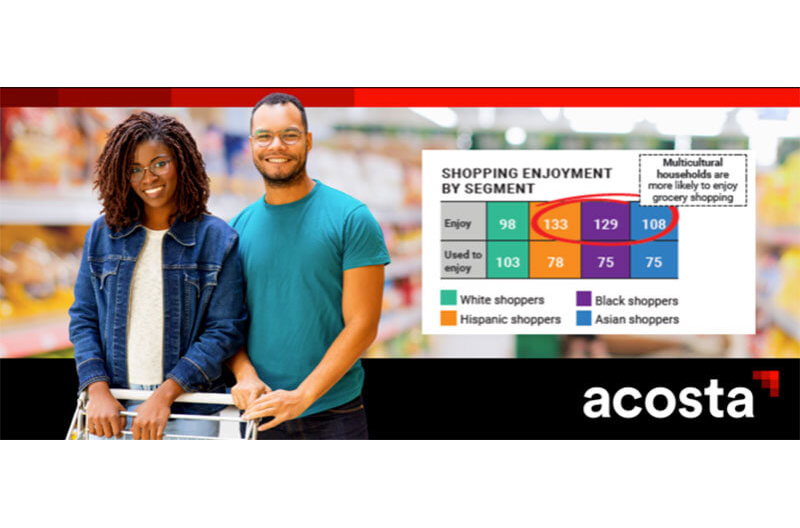Jacksonville, Florida-based Acosta has released its second “The Why? Behind The Buy: Multicultural Shopper Insights” report, detailing grocery shopping trends and behaviors of multicultural consumers.
With $3.9 trillion in buying power, Hispanic, Black and Asian shoppers in the U.S. are making an impact on the grocery industry. According to Acosta’s research, online grocery shopping among all shopper groups grew last year, with Hispanic (29 percent), Black (33 percent) and Asian (40 percent) shoppers expecting to spend even more online in the future – indicating the influential role consumer behaviors play in the retail market.
“Multicultural households continue to be a driving force of purchasing power and will account for half of the U.S. population in less than 25 years. This means understanding multicultural consumers and their shopping habits is key for grocery retailers to connect with an emerging group and provide a more personalized customer experience,” said Colin Stewart, EVP of business intelligence at Acosta. “Multicultural shoppers’ growing preference for e-commerce is significant to the future of grocery retail, though in-store consumer preferences among these groups demonstrate key insights for retailers to better meet the needs of shoppers. For example, Asian shoppers are most concerned with a store’s proximity to home and focused on ease and convenience while Black and Hispanic shoppers are attracted to competitive prices.”
Acosta’s research provides in-depth insight into multicultural consumers’ evolving grocery shopping habits and preferences including:
Grocery shopping channels
Traditional channels like grocery stores and mass merchandisers still dominate the landscape, but online grocery shopping gained momentum in 2020 across all shopper segments.
Fifty-four percent of Hispanic consumers shop for groceries online, and these shoppers spend 42 percent of their monthly grocery dollars online.
Forty-one percent of Black consumers shop for groceries online, and these shoppers spend 39 percent of their monthly grocery dollars online.
Forty-one percent of white consumers shop for groceries online, and these shoppers spend 38 percent of their monthly grocery dollars online.
Forty percent of Asian consumers shop for groceries online, and these shoppers spend 39 percent of their monthly grocery dollars online.
Grocery spending and shopping enjoyment
While all online shopper segments spent about 40 percent of their grocery dollars online, multicultural shoppers are most likely to increase their spending in the future.
Forty percent of Asian shoppers expect to spend even more money online grocery shopping in the future.
Thirty-three percent of Black shoppers expect to spend even more money online grocery shopping in the future.
Twenty-nine percent of Hispanic shoppers expect to spend even more money online grocery shopping in the future.
Twenty-five percent of white shoppers expect to spend even more money online grocery shopping in the future.
When asked about their levels of enjoyment while shopping for groceries, multicultural households were far more likely to enjoy the experience than white shoppers.
Grocery store value
While the majority of Black, Hispanic and white shoppers consider low prices to be the most important grocery store attribute, Asian shoppers are more interested in convenience.
Forty percent of Asian shoppers most highly value grocery stores that are close to home.
Thirty-six percent of Black shoppers most highly value grocery stores with the best prices.
Twenty-nine percent of Hispanic shoppers most highly value grocery stores with the best prices.
Forty-three percent of white shoppers most highly value grocery stores with the best prices.
Brand preferences
Perceptions of food brands are largely determined by quality across all consumer segments, especially among white shoppers.
Fifty-six percent of white shoppers most highly value food brands offering good quality for the price. Fair everyday prices are also a priority (38 percent).
Fifty-one percent of Black shoppers most highly value food brands offering good quality for the price. Trustworthy brands are also a priority (38 percent).
Forty-six percent of Asian shoppers most highly value food brands offering good quality for the price. Fair everyday prices are also a priority (34 percent).
Thirty-nine percent of Hispanic shoppers most highly value food brands offering good quality for the price. Fair everyday prices are also a priority (32 percent).
Acosta’s “The Why? Behind The Buy: Multicultural Shopper Insights” report was compiled using its “The Why? Behind the Buy” survey conducted in fall 2020.
Acosta is an integrated sales and marketing services provider that enables consumer packaged goods brands and retailers to win in the modern marketplace by delivering progressive solutions and exceptional service.
The company recently acquired Impact Group. See story, here.

